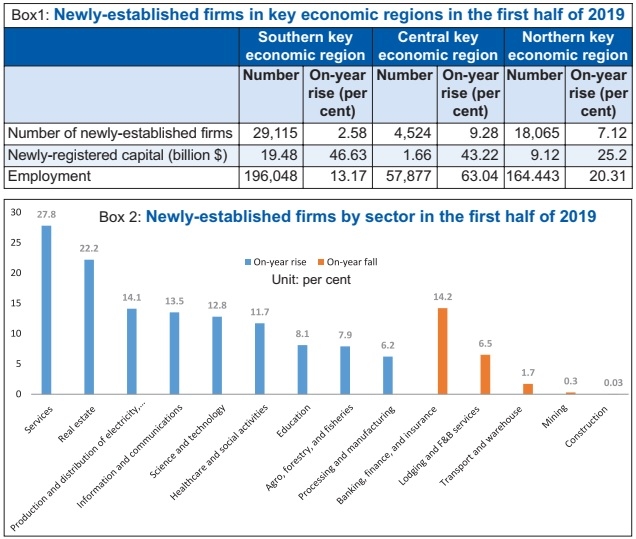MPI rolls out milestone Whitebook
 |
| The White Book provides a comprehensive overview of Vietnamese businesses, Photo: Le Toan |
Last week, Heinz Karrer, president of the Swiss Business Federation, returned to Vietnam for the 12th time. Like others, he came seeking business and investment co-operation.
This time, Heinz Karrer and tens of Swiss companies accompanied Guy Parmelin, head of the Federal Department of Economic Affairs, Education and Research, on a working session with the Vietnamese Ministry of Planning and Investment (MPI) where they signed a collaboration agreement on eco-industrial park development in Vietnam.
“I have been working for more than 30 years with Vietnamese firms via factory partnerships between Swiss and Vietnamese companies. The transparency of the legal framework and information about business and environment is important for investors. If Vietnam creates a safe and stable legal environment, the country will attract more foreign investment,” Karrer told VIR.
 |
Most awaited transparency
Transparent information on business, investment, and the legal framework has been an issue of special concern for years among foreign investors in Vietnam, including those from the EU, Japan, the US, South Korea, and Singapore.
In preparation of a potential new foreign direct investment (FDI) wave coming with the Comprehensive and Progressive Agreement on Trans-Pacific Partnership and the EU-Vietnam Free Trade Agreement entering into force, the MPI last week announced the launch of the very first Vietnam Whitebook on Businesses, which is expected to be published in August, showcasing the government’s efforts to create a healthy, transparent, and safe business climate through concrete action.
“With the strong development of businesses and the drive for increasingly deep global economic integration, transparent business information is becoming extremely important. The Whitebook on Vietnamese Businesses is the premise for the development of a transparent and healthy business environment, while effectively serving policymaking and macroeconomic monitoring,” said Nguyen Chi Dung, Minister of Planning and Investment.
According to Nguyen Bich Lam, general director of the General Statistics Office, the annual publication 2019 has four main parts. The first focuses on the context of business development in 2018, the second provides a general overview of Vietnamese business development in 2018 and in 2016-2018, the third offers solutions to business development, and the fourth lays out a set of criteria to assess business performance during 2016-2018.
The publication will cover the overall performance of all kinds of businesses from all economic sectors, cities, and provinces in Vietnam, including private firms, state-owned enterprises (SOEs), and foreign-invested enterprises (FIEs). The book will also include the rankings of FIEs, SOEs, and private businesses based on different criteria, such as growth rate, business efficiency, tax payments, and workers’ incomes in respective localities, among others.
Based on the database, foreign investors and international organisations will be able to assess investment and co-operation opportunities.
Vietnam has, so far, taken other actions including Resolution No.19/NQ-CP dated 2015 on continuing to implement tasks and solutions mainly focusing on improving the business environment to enhance national competitive capacity (now replaced with Resolution No.02/NQ-CP dated January 2019), and Resolution No.35/NQ-CP dated 2016 on business support and development to 2020.
Thanks to the great efforts, in the last three years, the number of newly-established firms rose significantly from 110,100 in 2016 to 131,275 in 2018. The growth momentum continued in the first half of 2019 with nearly 67,000 new businesses, rousing hopes of Vietnam fulfilling the target.
With this new move, the Vietnamese government is showing its strong determination to improve the business environment and aim towards the target of having one million operational businesses by 2020.
First-hand information
With the Whitebook, businesses and investors can access first-hand information about the business picture in Vietnam, including figures they could not before.
One piece of information FIEs are widely interested in is the performance of sectors and businesses in individual localities – a topic the Whitebook has ample information on.
As of the end of 2017, the service sector attracted the most attention with 390,765 operational firms, up 10.3 per cent from the same period in the previous year, followed by the industry and construction sector (164,189 businesses, up 12.2 per cent) and the agro-forestry-fisheries sector (5,463 firms, up 22.8 per cent).
Regarding localities, around 40 cities and provinces are appealing to investors with on-year increases of operating businesses at the end of 2017, with higher rates than the country’s average reported at provinces like Bac Giang, Ha Nam, Bac Ninh, Hung Yen, Hai Duong, and Vinh Phuc.
On average, the country has 14.7 operational businesses per 1,000 people of the working age population in 2018. Eight out of 63 localities have a higher density of operational businesses than the country’s average, including Ho Chi Minh City (54.4), Hanoi (41.1), Danang (38.6), and Haiphong (22.5).
Another highlight of the Whitebook is the illustrative figures it offers on the overall picture of business performance. Accordingly, the number of operational SOEs reduced by 6.6 per cent from 2016 to 2,486 by the end of 2017, while the number of private firms and FIEs rose by 10.9 and 15.5 per cent.
What is more, as of the end of 2017, 14.5 million Vietnamese people worked at operational businesses, up 3.6 per cent on-year. The industry and construction sectors attracted the most labourers with 9.3 million, up 2.8 per cent on-year, followed by the service (4.9 million, up 5.2 per cent) and the agro-forestry-fisheries (256,700, up 2.3 per cent) sector.
The total net revenue of all operational businesses in 2017 reached VND20.66 quadrillion ($898.26 billion), up 18.5 per cent on-year. The industry and construction
sectors took the lead with a total VND10.46 quadrillion ($454.78 billion), up 17.6 per cent, while services generated VND10.1 quadrillion ($439.13 billion), up 19.3 per cent. The agro-forestry-fisheries sector came fourth with nearly VND113 trillion ($4.91 billion), up 32.4 per cent.
The Vietnam Whitebook also has figures reflecting business efficiency. These include labour efficiency, average income, overall debt ratios, return on assets, and return on sales, among others.
Looking forward, the launch of the Vietnam Whitebook and the upcoming issuance of the new FDI attraction strategy by 2030 are expected to create a driving force for the country’s to increase the quality and quantity of FDI.
What the stars mean:
★ Poor ★ ★ Promising ★★★ Good ★★★★ Very good ★★★★★ Exceptional
Related Contents
Latest News
More News
- SK Innovation-led consortium wins $2.3 billion LNG project in Nghe An (February 25, 2026 | 07:56)
- THACO opens $70 million manufacturing complex in Danang (February 25, 2026 | 07:54)
- Phu Quoc International Airport expansion approved to meet rising demand (February 24, 2026 | 10:00)
- Bac Giang International Logistics Centre faces land clearance barrier (February 24, 2026 | 08:00)
- Bright prospects abound in European investment (February 19, 2026 | 20:27)
- Internal strengths attest to commitment to progress (February 19, 2026 | 20:13)
- Vietnam, New Zealand seek level-up in ties (February 19, 2026 | 18:06)
- Untapped potential in relations with Indonesia (February 19, 2026 | 17:56)
- German strengths match Vietnamese aspirations (February 19, 2026 | 17:40)
- Kim Long Motor and AOJ Suzhou enter strategic partnership (February 16, 2026 | 13:27)

 Tag:
Tag:




















 Mobile Version
Mobile Version